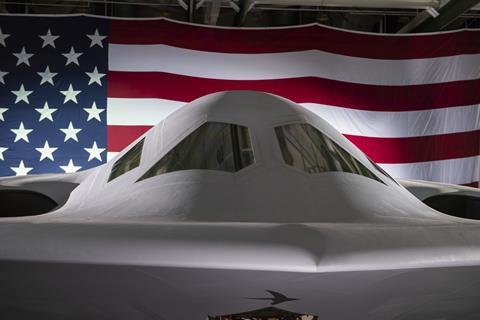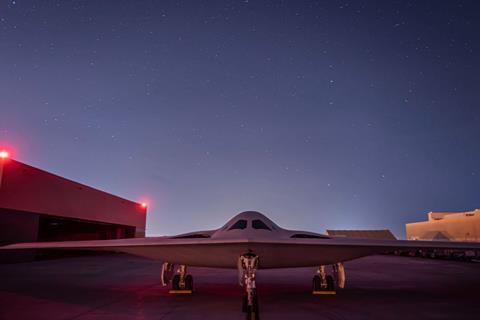Defence aerospace manufacturer Northrop Grumman expects the US Air Force (USAF) will approve an initial production contract for the B-21 Raider stealth bomber before the end of 2023.
Northrop chief executive Kathy Warden on 26 October said the company plans to complete first flight of the initial B-21 test aircraft within the next two months, with a low-rate initial production (LRIP) contract following shortly after that milestone.
“We are on track, anticipating first flight this year,” Warden said during a quarterly earnings call with investors.

“First flight is a milestone that the air force is looking to achieve before they make that [LRIP] award,” Warden adds. “We still expect that to happen this year.”
The USAF confirmed on 25 October that Northrop has begun taxi testing the first B-21, a critical step leading to first flight.
The USAF ultimately plans to acquire at least 100 B-21 bombers to replace its fleet of Boeing B-1B conventional bombers and its small inventory of stealthy but ageing B-2 Spirit bombers, also produced by Northrop.
The LRIP phase of new aircraft and munitions programmes signifies transitioning from engineering and manufacturing design work to small-quantity production of initial examples.
Northrop has said it is initially assembling six B-21 airframes. The first flight aircraft, unveiled in December 2022, will be a “production-representative” test model designated “T1”.

The production-representative designation signifies that Northrop anticipates its early B-21 test models will have a high-degree of commonality with the final production design.
In September, prior to taxi testing, the T1 airframe underwent engine testing. It was powered up for the first time in the second-quarter of 2023.
Notably, Warden says Northrop does not expect the near-term B-21 flight schedule to be impacted by the current legislative dysfunction in the US Congress.
The US Department of Defense is now operating under a short-term funding agreement that expires in November. Failure by lawmakers to pass a new full-year budget could disrupt new programmes that need funding authorisations.
However, with major programmes already funded for several months, or even multiple years in the case of certain precision munitions, Warden says the political gridlock is not currently a threat to Northrop’s operations.
“We are not seeing any risk to our portfolio at this time,” she says.
The Northrop CEO is “pleased” that Republican lawmakers in the House of Representatives approved a new House Speaker, a position required for normal functioning of the legislative process, including for voting on appropriations bills.


























